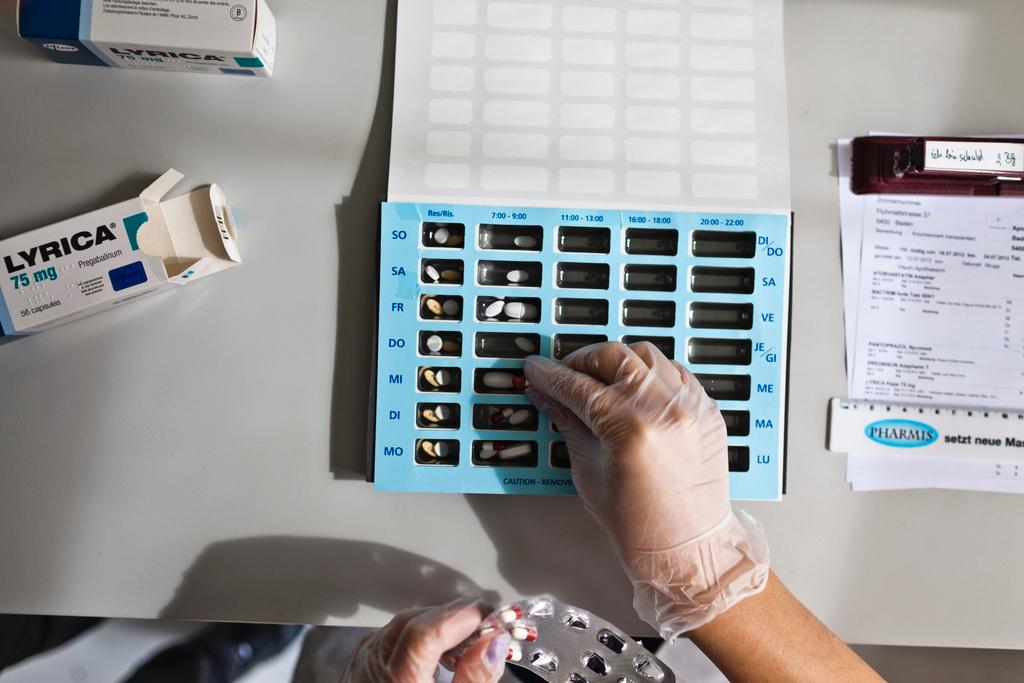Health policy battle exposes interest groups’ political reach

The debate leading up to Sunday’s national vote on public health insurance has reawakened controversy on the role of lobbies in Switzerland’s healthcare policy. Do interest groups have too much influence on parliamentary decisions?
Lobbying is a part of the Swiss legislative process and exists for all sectors of political activity. Yet nowhere is it as powerful as in the area of healthcare policy, says Claude LongchampExternal link, a political scientist who heads the research institute gfs.bern. Patients, doctors, hospitals, cantons, the pharmaceutical industry, pharmacists, insurance consumers and insurance companies are all actively defending their often conflicting interests.
“The Swiss healthcare market is worth more than CHF60 billion ($63 billion) a year, of which about half is affected by political decisions,” says Longchamp. “With the state having such an impact on the distribution of financial resources, it is only natural that there should be very intense lobbying going on.”
Compared to other industries, when it comes to healthcare “the penetration of interest groups in parliamentExternal link is deeper and extends further all through the parties”, he adds.
Infiltrating committees
Longchamp’s view is shared by Sarah BütikoferExternal link, a researcher at the University of Zurich’s Institute of Political Science. She notes that this kind of infiltration is clearly visible in the make-up of parliamentary committees on social welfare and health, which is where legislative proposals are developed for the House of Representatives and Senate.

More
Single health insurance system set for defeat
“In the House committee, 21 members out of 25 are directly linked to companies or organisations in the healthcare sector, and in the Senate it is 10 members out of 13,” explains Bütikofer, who wrote her doctoral thesis on the Swiss parliament.
Or, as Longchamp summarises, “almost all the members of these two committees represent some interest group in the healthcare field”. This situation is not found on any other parliamentary committee, the two researchers point out.
The committees – and thus their members – have a key role in parliamentary decisions. Therefore, the presence on the two committees of board members, presidents of boards and executives of companies and organisations directly concerned by parliamentary decisions is a matter of some controversy.
Independence in doubt
Such parliamentarians are often accused of being paid lobbyists. This is actually forbidden by the rules of parliament, which stipulate that lobbyists may not belong to parliament and cannot take part in debates.
However, the politicians involved reject accusations of lobbying and claim to be just like all other Swiss parliamentarians, who are not career politicians but part-timers making their living from another profession or from holding other offices. They insist that their decisions are independent and based on their convictions, not dictated by the company or organisation that pays them.
Transparency a few clicks away
Regularly updated information on links to interest groups of all federal parliamentarians and their “guests” in parliament is now being made available by a team of journalists and computer technologists who have created LobbyWatchExternal link, a “platform for transparent politics”.
In future, this project will be able to immediately display these links for members of every parliamentary committee. This is already being done for the two healthcare committees.
“It would be interesting to analyse the work of the committees in detail – all the proposals that are put forward, to find out who they are coming from and the context in which they are presented, and to identify the positions of every single member,” says Bütikofer.
Yet only the debates in the federal chambers are public, while the discussions within committees remain confidential. Researchers can consult the minutes, but they cannot quote the discussions.
The remuneration paid to parliamentarians for the positions they hold in companies or organisations is also hidden behind a veil of secrecy. Last June, parliamentarians from the political right and centre turned down a proposal that would have required them to state whether activities they engage in are remunerated, without needing to reveal the amount.
The parliamentarian who proposed this initiative, Isabelle MoretExternal link of the centre-right Radicals, was deserted by almost all her party colleagues. She did receive support from the centre-right Liberal Green Party, the centre-left Social Democratic Party and the Green Party, but these do not form a majority in parliament.
Lifting the veil
Bütikofer sees a problem in this lack of transparency, since at the moment “we do not know the full extent to which members of parliament may be dependent on the various interest groups. Ideally, a parliamentarian should not be on the payroll of a company or an organisation which is trying to influence decisions of parliament.”
In the healthcare field, the pharmaceutical industry and the health insurance companies are the most powerful lobbies.
“They have numerous accredited lobbyists. Their presence inside the federal parliament buildings is important for cultivating direct relationships with parliamentarians and keeping those relationships stable and permanent. If someone wants to have influence, they need a network of contacts, and to get that they have to work at it all the time,” says Bütikofer.
To Longchamp, on the other hand, there is “an equilibrium of sorts between the different interest groups in healthcare, because all of them are well represented in parliament.”
It does, however, have “the effect of holding back the development of health policy, since, given this balance of power between the various interest groups, it is hard to find consensus and put through reforms,” he admits.
Furthermore, when an interest group succeeds in getting its way in parliament, direct democracy may still have its say, since it is quite likely that the other side will try to bring the issue to a referendum. And in recent years, the nation’s voters have been mostly averse to change.
The battle of the healthcare lobbies will surely continue over the coming months, with parliament set to decide on several significant reform measures. For example, they will decide whether to amend legislation on therapeutic products, where huge financial interests are at stake. The Swiss drug market alone is worth CHF6 billion a year.
Lobbyists in the shadows
Every member of the federal parliament can designate two people as having the right to attend parliament as his guests. These may be representatives of interest groups, who thus have the opportunity to engage in lobbying inside the parliament building. The accredited persons are not obliged to declare what their mandate is, so plenty of lobbyists show up on the accreditation lists of the two houses of parliament as “guests” or “aides”.
On the other hand, more and more professional lobbyists state the public relations firm they belong to, but no one knows what client they are actually working for.
All attempts to lay down rules and make these links transparent have so far failed in parliament.
Translated from Italian by Terence MacNamee

In compliance with the JTI standards
More: SWI swissinfo.ch certified by the Journalism Trust Initiative










You can find an overview of ongoing debates with our journalists here . Please join us!
If you want to start a conversation about a topic raised in this article or want to report factual errors, email us at english@swissinfo.ch.